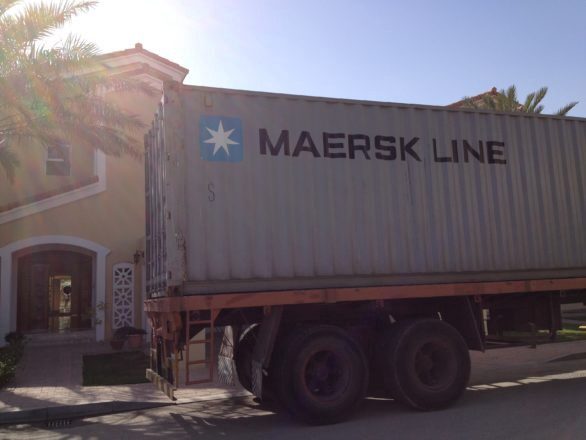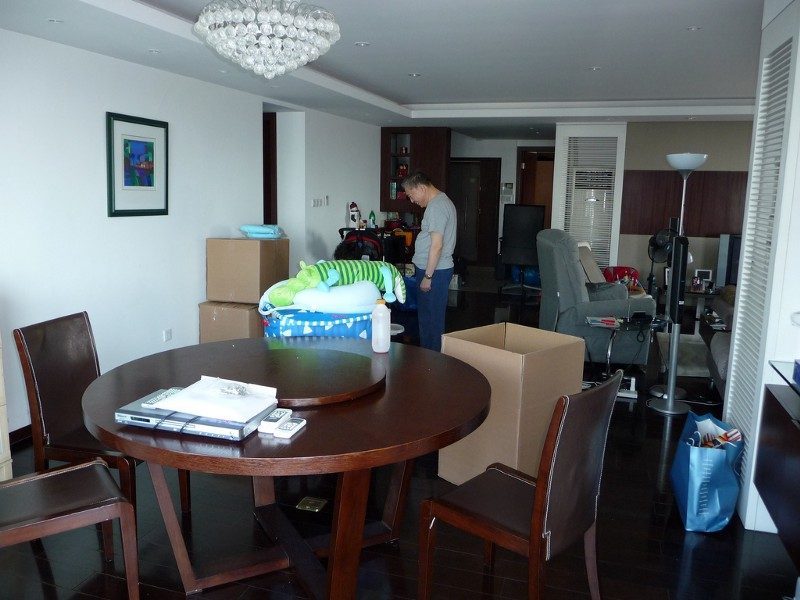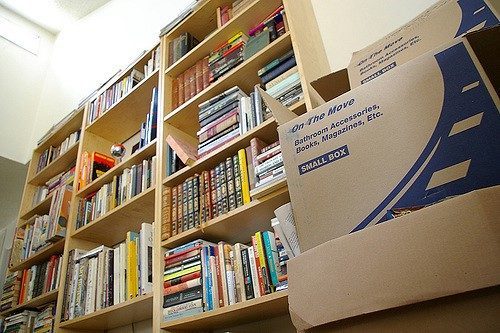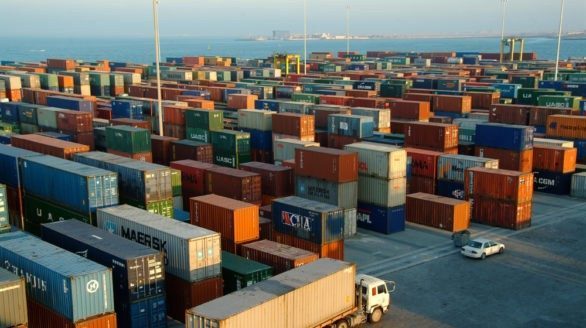By Doha News Team

An ongoing sea blockade of Qatar by three of its Gulf neighbors has caused headaches for some residents leaving the country this summer.
The ban on any Qatar vessels entering Emirati, Saudi or Bahraini waters or ports has particularly affected people moving to the blockading countries.
These expats said they have no way to transport their possessions by sea or land. Many have thus been forced to sell all their furniture, household goods and vehicles at heavily discounted prices.

Others leaving Qatar for good and heading home face paying thousands of riyals in storage charges for their goods, until new shipping routes out of the country get up and running.
New routes
Before the blockade, which began on June 5, most shipping came to Qatar through Jebel Ali port in the UAE.
Since that was closed off, Qatar authorities and the major shipping companies have been working to find alternative routes.
Hansa Neuberg arriving at #HamadPort from #SoharPort, Oman.#HamadPort Qatar's gateway to world trade. pic.twitter.com/HrTfjOlzdT
— Mwani Qatar (@MwaniQtr) June 12, 2017
This week, they announced that the Omani ports of Salalah and Sohar, as well as India’s Mundra and Nhava Sheva ports would be used instead.
The first vessel on the Indian route may dock in Qatar as early as this weekend, while ships traveling to Oman are expected to arrive at Hamad Port on June 26.
However, summer is one of the busiest times of year for people leaving Qatar for good, as well as for shipping personal possessions overseas.
Selling everything
The temporary halt in domestic cargo services has led to a significant backlog of containers waiting to leave the country.
Some moving firms closed their books to new orders last week as they ran out of storage space.
Others warned residents about additional handing and storage costs.

Lebanese resident Imaid is moving to Dubai with her family next week, after five years in Qatar.
She had planned to drive her car to the Emirati city, and to ship the family’s possessions to their new home.
But when the embargo was imposed, she was told this would be impossible, leading to a “sad and traumatic” situation.
“I had to sell everything — bedrooms, dining rooms, all my children’s things. In fact, when this happened, that was the first thing I thought of — that we couldn’t take the children’s bedrooms with us.
“Moving is emotional, especially for kids. You really want to keep their beds so they have some familiarity in the new house. But we can’t do that,” she told Doha News.
Uncertain times
After hearing the news of the blockade, Imaid said she was advised by her removals firm to sell their goods, as they were uncertain how long the ban would last.
“In 24 hours, we had to change our plans. I sold my car for a really low amount of money.”
She added, “I lived in Qatar for five years, and in Abu Dhabi before. You collect items from country to country. The house I have now is the fruit of eight or nine house moves in nine years. It’s an emotional process to go through, selling everything, in a limited time.”
The cost of air freight, particularly as it has to make two flights via Oman or Kuwait, made sending anything other than the most personal and important possessions financially impossible, Imaid said.
“We will be starting from scratch. It is expensive and draining.”
Storage fees
Meanwhile, British resident Andy is moving to the UK this summer with his wife and two children after spending nine years in Qatar.
The family had booked a 20ft container to ship their personal goods, which had been due to be packed on June 11.
After news of the shipping embargo broke, Andy said his family briefly considered delaying packing, to see if the situation would get resolved.

But in the end, Andy foot the bill to have the moving company pack their items and store them in their depot.
“This has proved to be the best decision. We’re being told other movers are saying they have no more storage and aren’t taking any new customers. From a personal perspective, I’m pleased we’ve managed to scrape through, although with additional charges,” he said.
Movers typically charge a one-off handling fee of over QR1,000 to transfer boxes from a container back to their storage unit, plus storage costs of around QR1,200 per month for a 20ft container.
However, the family has yet to be told when their container will be loaded onto a ship.
The new routes are also likely to take several weeks longer and cost more than previously.
Optimism
Another British expat named Nicola is preparing to leave Qatar this summer and had previously booked a moving firm to pack up all her household goods into a container in mid-June.
She has now delayed the date until the end of the month, and said the company — Crown — was optimistic that new routes would be successfully up and running by then.
“The firm have been great — they agreed to swap the dates without a problem and they’ve reassured us fully that everything should be ok by the end of June,” she said.

Doha News asked a number of moving companies for a comment on how the Gulf crisis is affecting business.
Some did not respond. But GAC, which is based in Jebel Ali in the UAE, said:
“In the light of recent news, GAC is closely monitoring the situation concerning the land, sea and air links between Qatar and its neighbors, including the current status of border crossings, port access and flights to and from Qatar.
The GAC team in Qatar and across our international network are ready to assist customers. We will provide further updates to customers when more information is available.”
Has your move from Qatar been affected by the blockade?
*Last names have been withheld on request, due to the political sensitivity of the ongoing situation.






